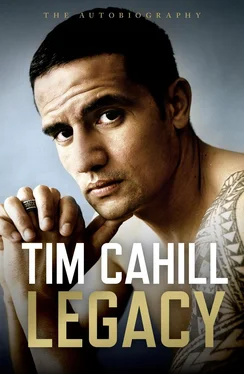By the time I was playing with Lakemba and Canterbury Reps, my dad’s expectations for me had grown. He’d always been this way, but, as I got older, he kept raising the bar and the scrutiny got more intense.
Back when we lived in Annandale, Dad would take all three of us brothers—Sean, Chris and me—down to the park at the back of Johnson Street for training. These weren’t casual kickabouts: he had us looking like little professionals, running through cones, doing sprints against each other, various triangle passing drills. He’d also make us work hard on our heading. He kept a ball inside a net-bag, hooked to the branch of a tree. Talk about an old-school trick. You rarely see anyone practising headers that way anymore. Each one of us in turn would run as fast as we could, leap up and head the ball, learning how to make good contact and get proper direction. And we’d better get it right, or Dad would make us do it over and over again.
Because he always stressed the importance of being two-footed, Dad would sometimes have us take the boot off our stronger-kicking leg—in my case the right—and have us shoot only left-footed. It’s a simple technique but a highly effective one.
Dad would also regularly take videos of my matches and then show them to me on the TV at home, focussing not on what I’d done well, but on what I could improve.
“Look, Tim, I know you scored three goals but you could have had four.” He used to stress that I needed to develop more power in my legs. He would also tell me that I was arriving in the box too early. He would freeze-frame the video and show me. “Look, here: if you’d held up your run a bit, see how much better positioned you’d be for the open cross?”
My dad was an instinctive motivator. He was never one for patting you on the back. No hugs after matches. And I’d never—or very rarely—hear him say, “Well done, son, you were terrific out there today.”
Still, I’d occasionally catch him, when I’d scored a nice goal—a well-timed header or difficult volley—and there’d be a momentary flash of pride. A glance that expressed words he’d never say, just for a second in his eyes.
That was priceless to me. Even as a kid, that’s all you need: to catch that fraction of a second of pride in your father’s eyes. I never needed anything more than that. The fact that he withheld praise, I think, prevented me from becoming complacent. He gave me enough praise to keep me going—and held back enough to keep me hungry.
In fact, I think my parents’ tough motivational style, more than anything else, is what made me into a top-flight footballer. So many times after a match, when I’d done alright on the pitch, I’d get in the car and my mum would take the sandal off her foot and smack me on the back of the head—not to hurt or anything, just chiding me, because that’s the Samoan way of doing things. My dad, meanwhile, was peppering me with his criticisms: “Why are you smiling, son? You could’ve won 5–0 instead of 5–3. Why weren’t you tracking back from the midfield? Helping out the back four? Letting in those late goals is nothing to be proud of.”
The funny thing was, when my parents said something similar to my brothers Sean and Chris, their response would be to nod and shrug: Yeah, so what? Not bothered . Yet each of my brothers in his own way was very gifted. Sean was an incredible goalkeeper and Chris, five years younger than me, was technically superb. My dad has often said that Chris had better footballing attributes than I did at his age. He was the more complete player, with better skills and a more developed body.
Where my brothers would shrug off our father’s critique of our playing, I’d go home and dwell on it. Yeah, you know, Dad’s right , I’d say to myself. If only I’d taken a better touch, and simply passed the ball into the net, instead of trying to smash it—two feet wide of the post! I missed that chance— missed it …
It would actually keep me awake at night, obsessing over the littlest mistakes my dad had scolded me for in some regular Under-10 or Under-11 game. It didn’t matter that I’d scored. I’d lie there angry at myself for the ones I hadn’t put in the back of the net. If a missed opportunity had meant a draw instead of a win, because I’d made the decision to go for power rather than simply pass the ball into the net, I’d beat myself up over it. I know that sounds ludicrously perfectionist for a kid of ten, but you’ve got to have that kind of drive to succeed in football. My commitment and passion were on a different level from either of my brothers’—and to this day, no one in the family knows exactly why.
I wasn’t a normal kid. I’m the first to admit it. I was definitely not normal . I was so obsessed with football that when I got up in the morning, the first thing I did was look at my boots, making sure they were clean and spotless. Not a speck of dirt or a grass stain better be on them. They had to look brand new. I had various official team kits. I especially loved the Manchester United kits—the green and yellow away shirt and the classic red home kit with the tie-up front. I’d make sure they were all hung up, clean and neat in the closet, looking just like they were in a shop window.
Before I left for school, I’d have my Lakemba or Canterbury Reps kit all laid out for when I got home, knowing I’d have after-school training. Boots spotless, shin pads perfect, my socks neatly laid out across the bed. When it was time to leave I had my trainers on, my boot bag ready, my water bottle filled—my parents didn’t have to do a thing. I already had that focussed mind-set of a full-time footballer.
At a very young age I was self-disciplined and an extreme perfectionist. I can’t recall a time when I wasn’t this way: my brother Sean used to tease me about it. He still does, because I’m known as the one of the three boys who can’t stand clutter, disorganization or anything out of order in my home or with my clothes.
I realize now, in hindsight, that in the six or seven years since I’d started playing football, a combination of my perfectionist personality, good role models, opportunities to play—even my mum’s Samoan whacks with her sandal and my dad’s post-match analysis—all of it turned a passion for the game of football into an obsession that would soon consume my life.
Конец ознакомительного фрагмента.
Текст предоставлен ООО «ЛитРес».
Прочитайте эту книгу целиком, купив полную легальную версию на ЛитРес.
Безопасно оплатить книгу можно банковской картой Visa, MasterCard, Maestro, со счета мобильного телефона, с платежного терминала, в салоне МТС или Связной, через PayPal, WebMoney, Яндекс.Деньги, QIWI Кошелек, бонусными картами или другим удобным Вам способом.












